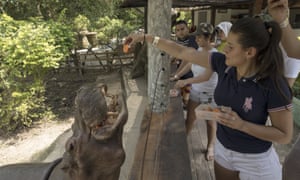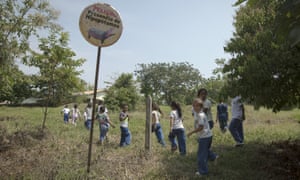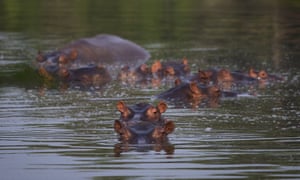https://www.theguardian.com/environment/2020/mar/24/pablo-escobars-cocaine-hippos-show-how-invasive-species-can-restore-a-lost-world-aoe
Pablo Escobar's 'cocaine hippos' show how invasive species can restore a lost world
Descendants of the drug lord’s pets bear similarities to extinct megafauna
When the drug lord Pablo Escobar was shot dead in 1993, he left behind a zoo stocked with wild animals alongside his multibillion dollar cocaine empire. The lions, giraffes and other exotic species were moved from the luxurious Hacienda Nápoles estate east of Medellín to new homes, but nearly three decades later, dozens of hippos, descendants of animals left behind, are thriving in small lakes in northern Colombia, making them the world’s largest invasive animal.
Now scientists say that contrary to the conventional wisdom that large invasive herbivore mammals have strictly negative effects on their new environments, Escobar’s “cocaine” hippos show how introduced species can restore a lost world.
A team of conservation biologists has compared the traits and impacts on the ecosystems from large invasive herbivore species like the Colombian hippo with their extinct counterparts from the Late Pleistocene (around 116,000-12,000 years ago) period like mammoths, giants sloths and giant wombats. They found some modern day invasive species restore parts of ecosystems not seen since before humans began driving the widespread extinctions of megafauna.
Their new study, published in Proceedings of the National Academy of Sciences, found that some introduced herbivore species are an almost perfect ecological match for extinct species from the Late Pleistocene, such as modern day wild horses known as mustangs and the extinct pre-domestic horses in North America, while others bring back a mixture of traits.
“The feral hippos in South America are similar in diet and body size to extinct giant llamas, while a bizarre type of extinct mammal – a notoungulata – shares with hippos large size and semiaquatic habitats,” explained study co-author John Rowan, Darwin fellow in organismic and evolutionary biology at the University of Massachusetts Amherst.
“So, while hippos don’t perfectly replace any one extinct species, they restore parts of important ecologies across several species.”
By comparing ecological traits of herbivore species from before the Late Pleistocene extinctions to the present day, such as body size, diet and habitat, researchers were able to quantify the extent to which introduced species were more or less similar to extinct predecessors.
The analysis found that by introducing large herbivore species across the world, humans had restored lost ecological traits to many ecosystems, thereby counteracting a legacy of extinctions and making the world more like the pre-extinction late Pleistocene.
Erick Lundgren, lead author and PhD student at the University of Technology Sydney, told the Guardian: “The word ‘invasive’ doesn’t really leave any room for organisms that do something that’s beneficial for another species. ‘Invaders’ don’t really help anything. And with that kind of anthropomorphic branding, you end up with a very limited range of research questions that are usually asked.”
The researchers give the example of wild pigs, which are widely disliked by farmers across the southern United States for destroying crops when large groups are “rooting” for food. But Lundgren said the behaviour is an ecosystem service that had been performed by other large herbivores that have since become extinct.
“There are many species that did what pigs do: just turning over soil. In North America, there were these giant peccaries. There were all these species that did the same thing in the late Pleistocene. For millions of years, everything evolved with this kind of rooting behaviour,” he explained.
“If you actually look at what that rooting behaviour does, it is of course density dependent. So if you have 10bn pigs rooting over every inch of soil, there are species that are going to lose their preferred habitats, 100%. But rooting actually does some interesting things. In Tennessee, they’ve found that trees actually grow faster because of the rooting of wild boar because they’re incorporating leaf litter in the soil, increasing decomposition rates and more nutrients become available quicker for trees.”
The study authors came from the University of Technology Sydney (UTS) in Australia, the University of Kansas, the University of California Davis and the Natural History Museum of Los Angeles County in the US., Sussex University in the UK, the Universidad de Alcalá in Spain and Aarhus University in Denmark.
We've got an announcement…
… on our progress as an organisation. In service of the escalating climate emergency, we have made an important decision – to renounce fossil fuel advertising, becoming the first major global news organisation to institute an outright ban on taking money from companies that extract fossil fuels.
In October we outlined our pledge: that the Guardian will give global heating, wildlife extinction and pollution the urgent attention and prominence they demand. This resonated with so many readers around the world. We promise to update you on the steps we take to hold ourselves accountable at this defining point in our lifetimes. With climate misinformation rife, and never more dangerous than now, the Guardian's accurate, authoritative reporting is vital – and we will not stay quiet.
We chose a different approach: to keep Guardian journalism open for all. We don't have a paywall because we believe everyone deserves access to factual information, regardless of where they live or what they can afford to pay.
Our editorial independence means we are free to investigate and challenge inaction by those in power. We will inform our readers about threats to the environment based on scientific facts, not driven by commercial or political interests. And we have made several important changes to our style guide to ensure the language we use accurately reflects the environmental emergency.
The Guardian believes that the problems we face on the climate crisis are systemic and that fundamental societal change is needed. We will keep reporting on the efforts of individuals and communities around the world who are fearlessly taking a stand for future generations and the preservation of human life on earth. We want their stories to inspire hope.
We hope you will consider supporting us today. We need your support to keep delivering quality journalism that’s open and independent. Every reader contribution, however big or small, is so valuable. Support the Guardian from as little as $1 – and it only takes a minute. Thank you.
.png)



沒有留言:
張貼留言